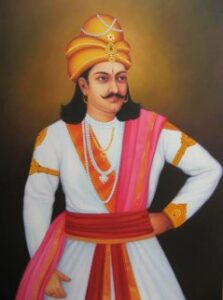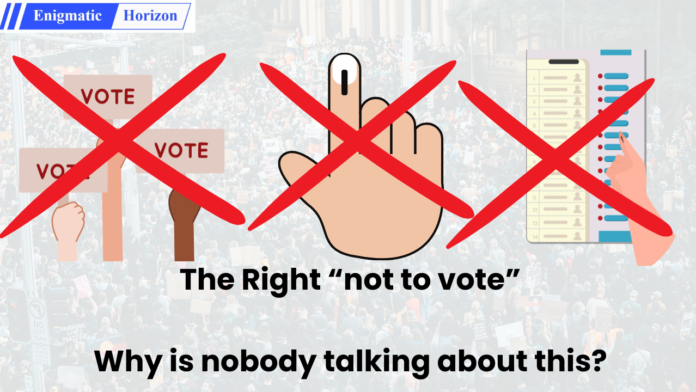Reetika Choudhury
Former President of India, Dr Pranab Mukherjee, had decided not to cast his vote in the 2014 general elections. This decision highlights that in a democratic country, we have the right to abstain from voting as much as we have the right to vote. However, media, influencers, and society at large often emphasize that voting is a civic duty and encourage us to exercise the right to vote. While participating in elections may indeed be important for the functioning of a democracy, the choice to abstain is also a valid expression of one’s democratic rights. Society will give you plenty of reasons why you should cast your vote, but here we shall take a look at five powerful reasons why many individuals can also choose not to vote.
Criminal Cases Among Candidates
Many of the candidates who contest in the elections have criminal cases against them. Politicians with criminal backgrounds prioritize their interests over public welfare, leading to corruption and poor governance. Recently, in the 2024 Lok Sabha election, the ADR report shed light on the prevalence of criminal cases among the candidates contesting in Phase 4. Out of 1,710 candidates in this phase, 360 have declared criminal cases against them, comprising 21% of the total candidates. The presence of criminally accused individuals in politics has eroded public trust in democratic institutions and processes.
Broken Promises and Economic Decline

The issue of politicians making promises that remain unfulfilled after being elected is a significant problem in our democracy. This cycle has further led to widespread disillusionment and distrust in the political system. When citizens lose faith in their leaders, it undermines the very foundation of democratic governance. In addition, people have also started questioning the effectiveness of the Parliamentary Democratic system, as since our country adopted the parliamentary democratic form of government, the GDP has continued to worsen. The rich have gotten richer, while the poor has continued to struggle for mere survival. During the periods where we used to have monarchy as our form of government, such as the time under Chandragupta Maurya, our GDP was robust, comprising around 32% of the world’s GDP. Hence, our country was called the ‘Golden Sparrow’. This contrast raises questions about the effectiveness of our current political system compared to historical governance.
Faulty EVMs
The concern about electronic voting machine (EVM) manipulation has been a topic of discussion and controversy in India for several years. There have been specific incidents where EVM malfunctions or irregularities were reported: In 2014 General elections & 2017 Delhi Municipal Corporation elections, reports emerged that votes cast for one party were being registered for another. These incidents have fueled widespread skepticism about the reliability and security of EVMs, which can make people feel that casting their vote might be pointless.

The threat of purchased votes
Candidates contesting in the elections attempts to sway voters through indirect means by meeting their needs just before elections by offering material goods, services, or financial incentives to voters in exchange for their support in an election. This practice undermines the integrity of the democratic process, particularly when a significant portion of the electorate is unaware or uneducated about such tactics. Additionally, it can perpetuate a cycle of corruption and dependency, where voters come to expect and demand rewards in exchange for their votes, eroding the foundations of democracy. So, you might be educated and have immense knowledge on politics, but your single vote may seem insignificant against the backdrop of a majority influenced by purchased votes. This also shows that the concept of majority being always right is dangerous!
A personal choice and political expression
It’s your personal choice not to vote, and nobody has the right to force or influence you in this decision. In the event that the elected leader turns out to be corrupt, at least you won’t feel guilty for making the wrong choice for your country! In a democratic system, abstaining from voting is a form of expression, which may show dissatisfaction with available choices or the political system itself! Some may argue that abstention forfeits one’s ability to influence the outcome, while others feel that it preserves personal integrity by not endorsing candidates or systems that we view as problematic.
You might be shocked to hear this, but the total money spent on the 2024 Lok Sabha elections is a sum of 120 lakh crores! Is it really worth spending this much of money to elect leaders who are most likely going to disappoint us again?
Let us end this article, with a famous quote from Mark Twain – If voting worked, they wouldn’t let us do it!
For such interesting articles, analyses and interviews, keep following Enigmatic Horizon on Facebook, Instagram, and Youtube.
